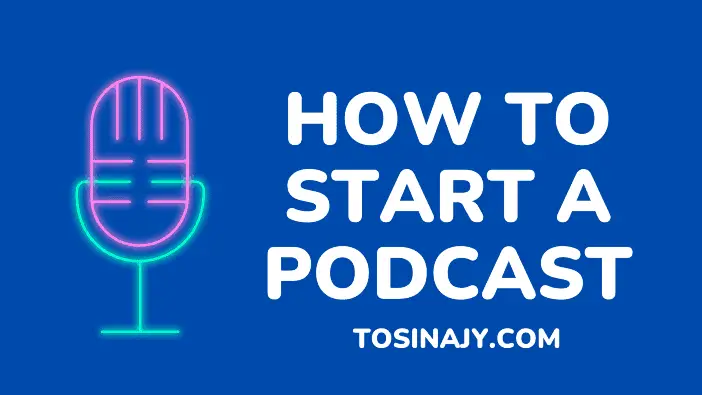According to Wikipedia, a podcast is an episodic series of spoken word digital audio files that a user can download to a personal device for easy listening.
Both individuals and businesses have come to the realization of the power of podcasting and they are now maximizing it for both purposes.
If you have a podcast, you don’t have to be bothered about how many people you can reach, because you can reach as many people as you want and also build your brand online and boost products purchase.
With this in mind, let’s get started.
What should you consider before starting a podcast?
1. Carefully plan your podcast
This planning involves your podcast contents, the goal you want to achieve with your podcast, purpose, style, and what will make you stand out from other podcasters.
2. Plan content calendar
You don’t want to sound disorganized to your listeners. So you need to take time to plan your content, that way you have a guideline and what to follow.
3. Create social media account and website for your podcast.
4. Purchase podcast equipment
As a podcaster, you need some basic equipment (microphone, laptop, headphones, audio recorder, and so on) to be able to effectively run your podcast.
5. Create Podcast identity
While setting up your podcast, you’ll be required to give your podcast a title, description, color, cover art, logo, and choose a specific genre. This is what makes up your podcast identity.
6. Plan strategy to monetize podcast
From the start, you have to make plans on how to strategize your podcast so that you can make money with it.
7. Plan your digital marketing strategy
How do you plan to increase your subscribers? What is the advertising goal? You need to plan this as early as possible before you start your podcast.
8. Research similar podcast niche
It is ideal for you to make research about your niche before you start your podcast. Who are your competitors? Is your niche oversaturated? Is there a way you can streamline it to be specific? You could what to do or not to do when you make research of your competitors.
9. Select podcast host
You need to choose the podcast host you’ll use considering certain features like bandwidth, storage, and more.
10. Pay attention to first episodes and establish podcast slogan
You need to put all your required effort into your podcast at the early stage. Introduce your show; what it’s all about. Create engaging and relevant content so that your listeners will always look forward to your next episode. At the same time, establish a slogan( music or a phrase) for your listeners to be familiar with, that way they are quick to identify your podcast.
11. Don’t be monotonous
As much as possible avoid monotony. Variety is the spice of life and the only way to avoid being boring is not to be one-directional. Have fun while podcasting and don’t limit everything to your script. Be you! Enjoy your podcast and let your listeners enjoy it too.
12. Transcribe podcast episodes
You can decide to convert your podcast episode into a written format by transcribing. That way, you could use it on your podcast website and social media pages.
13. Network with listeners and other podcasters
Building your relationship with listeners is important. It could be sending a newsletter to those who have signed up on your email list. Also, network with other podcasters. That way, you could feature on their podcast and even gain new listeners on your podcast.
Building a successful podcast could take a long time and it requires you to be consistent and persistent.
Let’s take a look at how to start a podcast;
1. Have a target audience
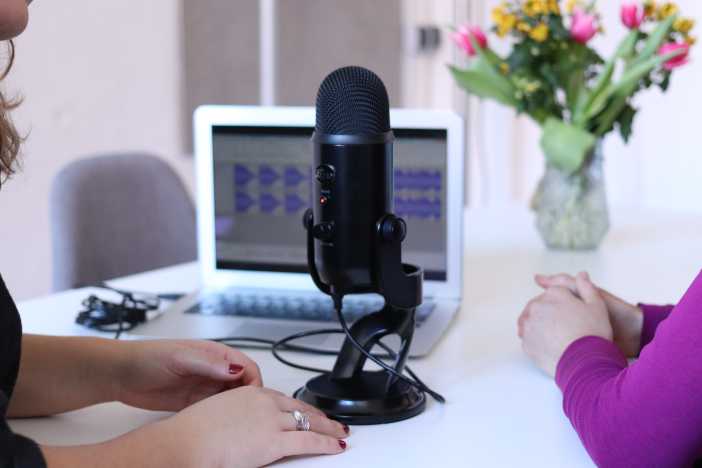
Before you start your podcast, you need to be aware that there are several genres to choose from. The genre you choose is dependent on who your audience is. It is not possible for your podcast to resonate with everyone.
This means your audience determines your content and you must be aware of this before you start podcasting. Your content must be in alignment with your genre and resonate with your audience.
For instance, a podcast that focuses on giving tech update has no business with someone interested in cooking and needs an update on the latest recipe.
This means you have to engage your audience by giving them relevant content. Everyone cannot be your audience because it is impossible for you to address all of the human interest.
Hence, the need to have your target audience in order to achieve a productive and successful podcast.
2. What are you offering?

After you’ve set a target audience, the next thing is to ask yourself what you have to offer your listeners. As earlier stated, you need to provide relevant contents, which is creating value.
Why should your listeners keep listening to your podcast? What do they stand to gain?
You must offer your listener a reason to come back: that is providing quality, relevant, enlightening, valuable, and interesting content.
The attention span of people is very short, so you must ensure to get your listeners’ attention and get them hooked to your podcast from your first episode.
You have to be straightforward with what you’ll be offering your audience and stick with that.
Note: Not everyone will be interested in what you’re offering and you must not water down the value or quality you are giving. Instead, it should keep getting better, and you’re still focused on your niche.
3. How frequent should you stream your podcast?

When you’re planning to start a podcast, you don’t want to be inconsistent. That’s one of the reasons you need to plan your content calendar. That way you can determine whether you want to release your podcast episode weekly or monthly.
The goal is to not overwhelm yourself or run out of topic ideas. If you are going for quantity or quality, decide that and structure your podcast based on what you want.
In the end, ensure to be consistent and make valuable contents available to your listeners.
4. How do you choose podcast style

Deciding what your podcast style or format will be is dependent on you. Your podcast style is almost as important as you’re your content.
Your podcast can either be an interview, educational, storytelling, conversational, motivational, or voiceover.
Whatever format you choose, make sure you are consistent. You don’t want your listeners to be confused about what format your podcast is.
5. What recording or podcasting equipment do you need?
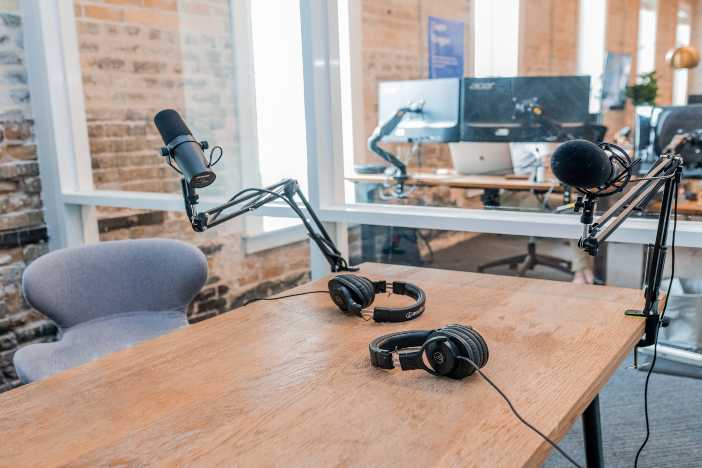
We’ve stated earlier the podcasting equipment you’ll need for your podcast like a microphone(single and multiple), headphones, and so on. Why do you need recording equipment?
As a podcaster, you are conscious of the delivery of your podcast. You want your audio quality to be top-notch with no distraction so that your listeners will keep coming back for more.
You should be aware of the importance of equipment, it contributes to the overall success of your podcast.
Also, if you are unsure of what podcasting platforms to use, you could make use of Anchor, Audacity, or Pamela. They are easy to use.
On these platforms you can add audio effects to your podcast, cut and split audio, convert files, connect your podcast to a website and other platforms like Spotify where listeners can access your podcast.
6. How do you name your podcast?
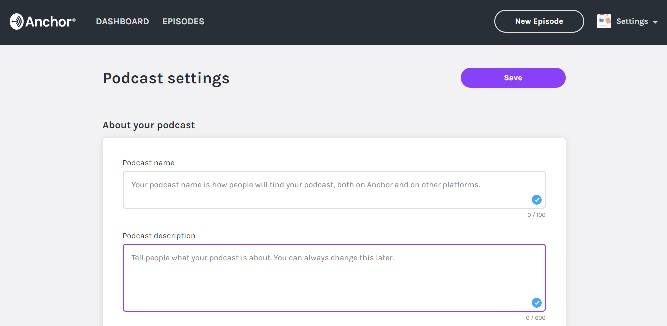
To name your podcast, remember I said earlier that people’s attention span is short. That is you have to be able to get their attention in very few seconds and that starts with your podcast name and title.
The last thing you want is for people to be uninterested in your podcast because of the name or title. Before you name or title that podcast, Here are key things to consider;
1. It must stand out
The last thing you want to do is to make your podcast hidden amidst several others. It could be confusing for your listeners to know which is yours if you are using the same. So your name has to be unique to you.
2. It must be easy to understand
While it is advisable to stand out, your podcast name has to be relatable and easy to comprehend. That means you would be mindful and not make your podcast name complex, but something simple that they can easily understand.
3. It should be brief
If your podcast name or title is long, then you may be shooting yourself on the leg. Let it be brief and concise to ensure you have your listeners’ attention. Avoid any form of ambiguity or complexity.
4. It must be informative and descriptive
Your title must have basic information about your subject. That is, what is your title directed at or what are you trying to pass across. It should describe what your podcast is targeted at.
5. It must be creative
Your podcast name or title should reveal your creativity. Something that hints your listener about a bigger picture and piques their interest.
You could also decide to use your name as your podcast name or title. The goal is to make your podcast the best you can for it to be successful.
7. How do you determine the length of your podcast episodes?
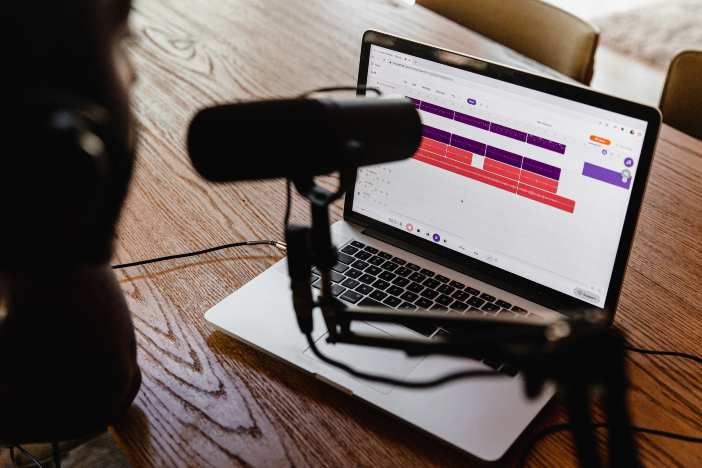
Regardless of how interesting your podcast is, it has to end. One thing you’ll want to avoid is to make your listeners uninterested because of the length of your podcast.
It is not about how long or short but the value your podcast has to offer.
Yes! There is no rule guiding the length of a podcast episode, but it’s best to keep your podcast episode brief and concise.
Also, your audience and niche might be a determinant of your length. The major is that the length of your podcast shouldn’t be a turn off for your listeners.
Summary
A podcast is a great way of building your audience online. Currently, there are a lot of podcasts that you can always get ideas from.
At the same time, you need to be conscious of how to stand out amidst a ton of other podcasts. What void are you filling? What is the value you’re offering? Why should your listeners tune into your podcast instead of your competitor’s?
Your podcast should be relevant to your audience and it should pique their interest. If not you might not be able to achieve your desired result. Don’t try to imitate or be like someone. Be you! And be focused on your niche.
Also, remember to properly name and title your podcast, use the right recording equipment, make enough preparation, and be consistent. With time, your podcast begins to grow and you can start monetizing your podcast.
